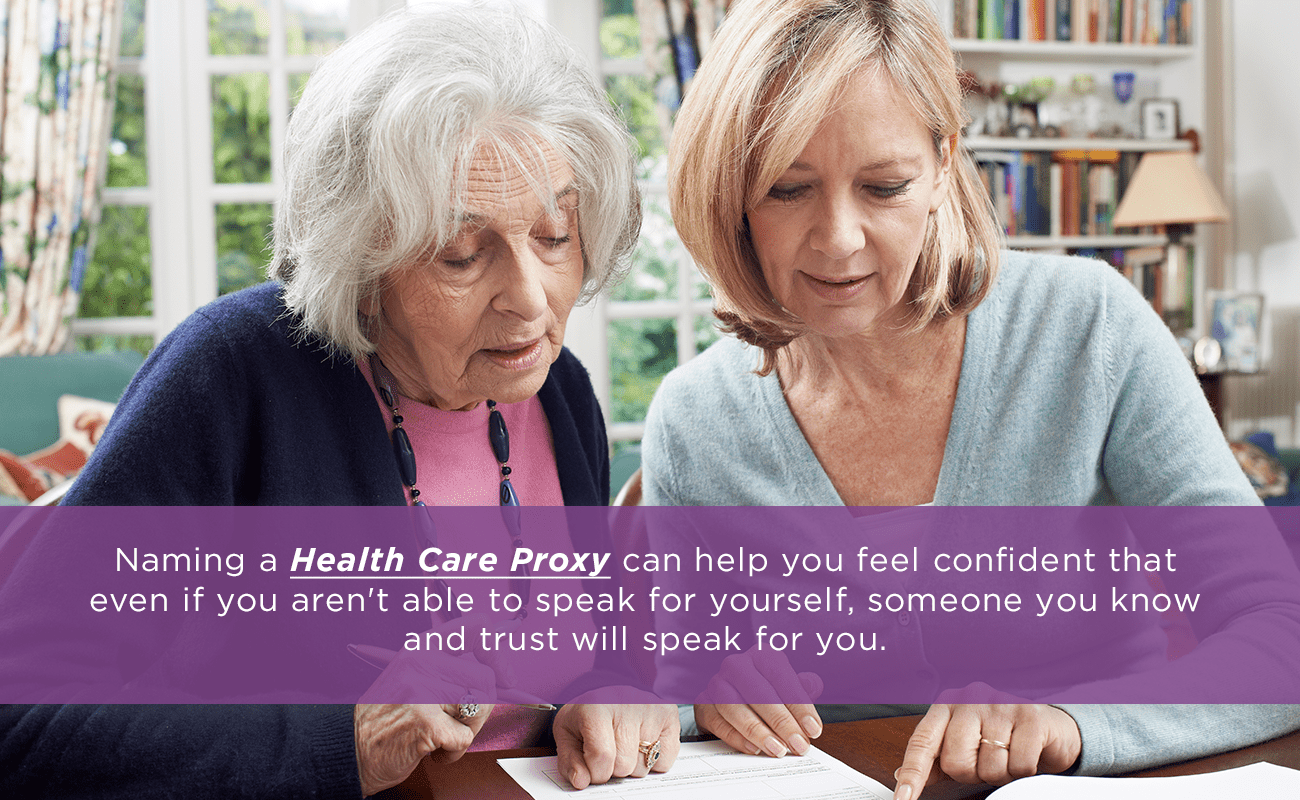Take Control of Your Health Care Future With Advance Care Planning

You’ve probably made plans for your financial future by having a 401k or a life insurance policy. You’ve taken steps now to make sure you’re prepared for whatever tomorrow might bring.
You can prepare for your health care future with advance care planning. What is advance care planning? If you are ever unable to speak for yourself, advance care planning lets doctors and hospitals know what kind of care you want and don’t want. Planning ahead and having the proper documents in place removes the burden from your family and loved ones of making your medical decisions.
- Talk to your doctor He or she can recommend a course of action specific to your individual health needs.
- Talk to your family and friends Consider whom you might want to name as a health care proxy, explained in further detail below.
- Visit with an advance care planning facilitator CDPHP offers no-cost advance care planning sessions. A certified facilitator will take the time to speak with you about your health care decisions and help make sure you have the right paperwork filled out. Call 1-888-94-CDPHP (23747) to schedule an appointment.
- Put it in writing All advance care planning directives need to be put into writing. It is advisable to give a copy of each to your doctor, your attorney, and any family or friends you deem appropriate. Keep your own copy in your wallet and somewhere visible in your home, should first responders need to refer to them.
- Update as necessary Review your choices periodically, especially when your health changes. If your wishes change, be sure to notify your health care team as well as family and friends.
Naming a Health Care Proxy
In New York state, you can name a health care proxy. You choose this person by filling out a form that appoints them the decision maker for your care, should you be unable to communicate your wants and needs yourself. You can designate your health care proxy as sole decision maker, leaving any and all decisions up to them, or you can limit which decisions this person can make. The key to ensuring that your wishes are carried out is having an open, frank discussion with the person you intend to name your health care proxy. This person must be at least 18 years old, and can be a relative or close friend.
Even if you are in perfect health, it is never a bad idea to name a health care proxy. Your health care proxy can be designated to follow the wishes expressed in your living will. However, if you are suffering from a chronic illness, or could lose decision-making capacity in the near future, you may want to consider filling out a Medical Orders for Life-Sustaining Treatment (MOLST) form.
The MOLST Form: Who Should Have One?
The MOLST form is a New York State Department of Health (NYSDOH) approved form that is filled out by a physician after a discussion with you about your wishes for care should you be hospitalized. It immediately becomes an order that all health care providers must follow, including hospitals and nursing homes, in addition to community providers, such as emergency medical services (EMS).
Unlike a health care proxy, the MOLST form has been approved for use by minors. It should be initiated if you or a minor child are chronically ill or could die or lose decision-making abilities within the next year. It follows the patient from home to hospital and back again, if necessary. It should be reviewed periodically, especially as a condition progresses.
The MOLST form contains sections pertaining to: resuscitation, intubation, and mechanical ventilation; future hospitalization and transfer; artificially administered fluids and nutrition; antibiotics; and instructions about other treatments not listed. The NYSDOH provides a series of checklists to help health care providers complete the MOLST form based on whether or not an adult has capacity, and also whether or not they have a health care proxy. A checklist and glossary for minor patients is also available.
Creating a Living Will
A living will is written document that serves as evidence of your wishes when it comes to your health care. Planning to write one provides an opportunity to consider your values, and what types of treatment you would or would not want, should illness or injury compromise your quality of life. Your living will addresses end-of-life care options, including those pertaining to resuscitation, tube feeding, and comfort care measures.
There is no standard living will form, but your wishes must be documented in writing. At minimum, your living will requires:
- Your name
- The date you created your living will
- Your statement regarding your personal health care wishes
- Your signature
- Signatures and dates of two witnesses
- Statements from the witnesses confirming that you appeared to sign the document willingly
Having your living will notarized is not mandatory, but could be beneficial if you
need to seek medical care outside of New York state, especially in another state that requires it.
A Word About Organ and Tissue Donation
When making decisions about care that pertains to end of life, you should consider your position on organ, eye, and tissue donation. There are several reasons for this, including the need to make your wishes about donation known in the aforementioned documents, and also to inform family and friends. You can register as an organ donor through the New York State Department of Motor Vehicles website.
Again, though they can be difficult, advance care planning discussions will ultimately make an already challenging and emotional time slightly easier for your family and friends if they know your wishes up front. Taking the time to talk to your doctors and decide what is best for you based on your health, preferences, and values will go a long way in preparing for the unexpected.
 The Daily Dose
The Daily Dose
Comments are closed.